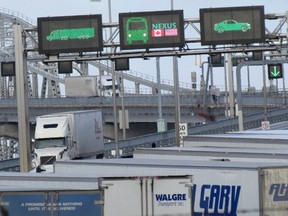Three truckers have been hit with hefty fines for smuggling alcohol and tobacco in their cabs across the Blue Water Bridge

Three truckers have been hit with hefty fines for smuggling alcohol and tobacco in their cabs across the Blue Water Bridge.
Advertisement 2
Article content
One, ordered to pay $30,000 for an elaborate scheme of ratcheting cases of liquor bottles in his bunk, narrowly avoided jail.
“This could easily have resulted in a period of incarceration,” said Justice Mark Hornblower, a veteran Sarnia judge. “It’s one of the most flagrant violations of the Customs Act that I’ve dealt with, certainly in a long period of time.”
Trucker Veerapathira Maniyakaghan, 56, of Brampton, declared one bottle of liquor as he pulled up to the Canadian side of the twin-span bridge linking Michigan and the Sarnia area on July 10, 2023, the court heard. But an inspection by border officers discovered 528 more bottles.
“It was an enormous quantity of alcohol,” federal prosecutor Brian Higgins told the judge. “It was packed in the cab of the transport truck from floor to ceiling using every available space and held in place with ratchet straps.”
Advertisement 3
Article content
Maniyakaghan was arrested, but declined to be interviewed.
“However, when asked where the receipts for the alcohol were, he reached into his pants and pulled the receipts out from his private area,” Higgins said.
The receipts showed the alcohol was valued at around US$14,000, which would have incurred more than $24,300 in Canadian duty fees.
After Maniyakaghan pleaded guilty to smuggling under the Customs Act, the prosecution and defense both suggested a $30,000 fine.
Simply the outstanding duty wasn’t paying enough, Higgins argued.
It’s rare to levy a fine approaching the $50,000 maximum – six months in jail is also an option – but this case deserved something close to that, he said.
“This was a purely commercial enterprise,” Higgins said. “It certainly violates the integrity of the border.”
Advertisement 4
Article content

Hornblower, who imposed the suggested fine, agreed.
“There was a significant quantity of alcohol. It was obviously planned out with little thought to anything other than the commercial gain,” he said.
Maniyakaghan’s lawyer told the judge his client was trying to pay off outstanding debts by selling the alcohol.
Also on July 10, 2023, trucker Senthuran Kandasamy, 36, of Ottawa, told Blue Water Bridge border officers he had no alcohol to declare. But during an inspection, officers discovered 48 1.75-litre bottles of Gray Goose vodka, 12 750-millilitre bottles of Johnnie Walker Blue Label Scotch whisky, and 12 one-litre bottles of Chivas Regal Scotch.
The total duty he tried to avoid was $5,061. After pleading guilty to the same charge, he was fined $7,500.
“It was an enormous quantity of alcohol for one person to have,” Higgins said.
Kandasamy told the officers at the time the alcohol was for a big party for his wife’s upcoming birthday.
Advertisement 5
Article content
Hornblower said it was premeditated and pointed out duties are meant to protect Canada’s commercial integrity. “This was a violation of that and it was significant,” he said.
Exactly one month earlier, on June 10, 2023, Huacheng Zhu, 47, told border officers he had nothing to declare. But one found seven cartons of Marlboro cigarettes hidden behind the passenger-side dash panel.
When confronted, Zhu claimed he only bought seven cartons. But the officer called the duty-free store in Port Huron, Mich., and the clerk told him a man matching Zhu’s description had just bought 25 cartons. Eighteen more cartons were found stashed in various places, including behind the fuse of an electric panel and inside headliners.

Zhu was ordered to pay a fine of $1,000 after pleading guilty to one count of attempting to evade compliance with the Customs Act.
“I’m so sorry,” he told the judge through a Mandarin interpreter. “I didn’t know it’s taken so seriously.”
The alcohol and tobacco seized from all three truckers was not returned.
The judge bailed the three truckers they’re now flagged at the border and likely will be searched every time they cross.
Article content
